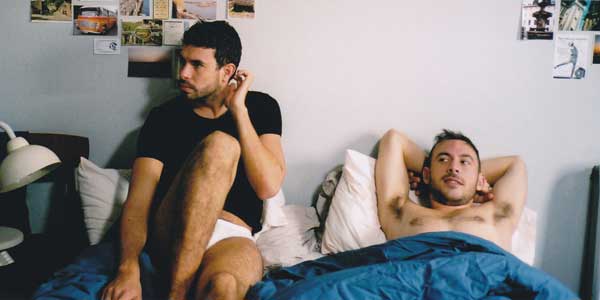 A few months ago, the actors’ union Equity announced the results of a survey that painted a mixed picture for LGBT actors in the UK. They’ve now followed that up with an initiative called ‘I Wont Pretend’, designed to support any actors who wishes to come out and which features a number of performers who believe their working lives have benefited from being open about their sexuality.
A few months ago, the actors’ union Equity announced the results of a survey that painted a mixed picture for LGBT actors in the UK. They’ve now followed that up with an initiative called ‘I Wont Pretend’, designed to support any actors who wishes to come out and which features a number of performers who believe their working lives have benefited from being open about their sexuality.
Equities’ survey revealed that while 81% of respondents said they were openly gay in their professional life and 94% were open to performers they are working with, 43% said they wouldn’t be so open talking to their agent. Perhaps most worrying, 35% of respondents said they have experienced direct homophobia in their professional lives. There is still a lot of pressure to stay in the closet, with the fear being open will affect your career.
Weekend star Chris New says that in 2006, he was advised by his agent not to talk about being gay, despite starring at the time in Bent, Martin Sherman’s play about the persecution of gay people in Nazi Germany. He’s also aware of an actor in LA, who is “taking very visible steps to go back to the closet.”
Others involved in the campaign include Anthony Sher, Sophie Ward, Amy Lame and Malcolm Sinclair. Sher told The Guardian, that when he started acting with the pioneering Gay Sweatshop theatre company in the 70s, he stayed in the closet. “I look back and blush. We all agreed to do it on the basis that it was stated that not all the performers were gay so you didn’t know who was and who wasn’t.
“Then, in the mid-80s, when I did the British premiere of Harvey Fierstein’s Torch Song Trilogy, I still wasn’t out. I was doing press interviews about this great gay play that I felt so strongly about for a specific reason and I wasn’t saying it – it was an astonishing waste of energy. But that’s the kind of tangle you get into if you’re not out.” Sher eventually came out in 1990, having been inspired by the likes of Ian McKellen and Simon Callow.
Max Beckmann, Equity’s equalities officer, says, “It’s about giving members the confidence to come out and if they do, that we’ll be there to offer them support. If actors experience homophobic bullying we would be able to raise that with the employer or if there was a case of member discrimination we would offer them legal assistance.”
It can still be tough though, with Sher admitting that if you want US success, it’s very hard to be out. “Test audiences are midwestern,” he says, “Very conservative people, so it’s possible that those kinds of people would be uncomfortable watching a gay man play a sex scene with a woman or whatever. But the world is changing, so that audience is going to change as well.”
He does however agree that the best way to change things is for more people to come out. “If everybody came out of the closet, [being gay] would cease to be an issue because there would be so many of us. Ian McKellen is the first out actor to be nominated for an Oscar – when people start doing things like that then things change.”
Chris New adds that being out is ultimately the best thing. “”There could be a million reasons why you might not get a job and gay people have to be careful about blaming [homophobia], because they’re reinforcing their own closet door.”
He adds, “Let’s say you were dating an actor who was in the closet. It would be a very bad thing to be able to say: ‘Oh, I’m dating this guy but I’m not allowed to say who it is.’ That’d be a bit of an ugly world to live in. There are quite a few actors who are in the closet who I just challenge. They usually um and ah and say: ‘You don’t understand.’ First, why would anybody be that interested – it’s kind of vanity to think that anybody would. And second, just get on with it and stop lying about yourself.”


 Although the BAFTAs completely ignored it in favour of more commercial but often far less worthy fare, thankfully gay Brit-flick hit Weekend has been getting its dues at the likes of the British Independent Film Awards and the London Critics Circle Film Awards. The latest to honour the movie is the Evening Standard British Film Awards, which last night gave Weekend writer/director Andrew Haigh the Best Screenplay gong.
Although the BAFTAs completely ignored it in favour of more commercial but often far less worthy fare, thankfully gay Brit-flick hit Weekend has been getting its dues at the likes of the British Independent Film Awards and the London Critics Circle Film Awards. The latest to honour the movie is the Evening Standard British Film Awards, which last night gave Weekend writer/director Andrew Haigh the Best Screenplay gong.
 The British Independent Film Awards were held last night, celebrating the best of the UK indie scene. This year in particular they really were a showcase of the strengths of British film and what an immense amount of talent there is out there.
The British Independent Film Awards were held last night, celebrating the best of the UK indie scene. This year in particular they really were a showcase of the strengths of British film and what an immense amount of talent there is out there. In the last few weeks Tom Cullen and Chris New have been getting major plaudits for their acting in the wonderful Weekend. However, we here at BGPS are horribly shallow people, so rather than following in the foosteps of the London Film Festival and nominating them for a Best Actor award, we just want to say they’re both pretty hot!
In the last few weeks Tom Cullen and Chris New have been getting major plaudits for their acting in the wonderful Weekend. However, we here at BGPS are horribly shallow people, so rather than following in the foosteps of the London Film Festival and nominating them for a Best Actor award, we just want to say they’re both pretty hot! Weekend is undoubtedly one of the best reviewed films of the year, but due to the fact it’s a low-budget, somewhat arty movie about a burgeoning gay relationship, it’s not exactly been warmly embraced by mainstream cinemas.
Weekend is undoubtedly one of the best reviewed films of the year, but due to the fact it’s a low-budget, somewhat arty movie about a burgeoning gay relationship, it’s not exactly been warmly embraced by mainstream cinemas.